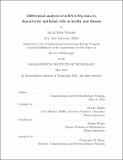Differential analysis of scRNA-Seq data to characterize epithelial cells in health and disease
Author(s)
Nyquist, Sarah Kate
DownloadThesis PDF (114.7Mb)
Advisor
Shalek, Alex K.
Berger, Bonnie
Terms of use
Metadata
Show full item recordAbstract
Barrier tissue maintenance and function is crucial to human health. These tissue systems, such as airways, the gut, lungs, and mammary gland, are surfaces for exchange of essential inputs to sustain life that must also tolerate significant insults from physical and biological hazards. Many individual specialized cells within these tissues collaborate to support proper tissue function. Over the course of a person’s lifetime, these tissues sustain a diverse array of perturbations in accordance with their core function. In the mammary gland this includes hormonally-driven re-arrangement to support the production of breast milk by mammary epithelial cells during lactation. In the respiratory system, this can include response to disease, such as allergic inflammation or infection with SARS-CoV2. Studies of these tissues and the cells of which they are composed can allow us to better understand how epithelia respond to diverse perturbations, leading to broad insights in how to mitigate dysfunction and promote health.
The recent advent of high-resolution methods like single-cell RNA-Seq (scRNASeq) have enabled the study of these tissues with unprecedented resolution, revealing substantial cell-to-cell heterogeneity and the role of diverse cell states in health and disease. Increased accessibility of these technologies led to a parallel explosion of data collected from diverse tissues and disease states along with available computational methods for their analysis. We describe the use of these methods to identify biological insights from scRNA-seq applied to barrier tissues under diverse perturbations. These include the nasal airway epithelium during allergic inflammation and alterations in mammary epithelial cells over the course of lactation. Both studies find that epithelial diversification aids in maintenance of these barrier tissues. Additionally, we describe a database of scRNA-Seq datasets and its application to an exploratory analysis of potential target cells for the SARS-CoV2 virus including types of epithelial cells in the gut and airway. This work underscores the need to create easy-to-use databases to enable rapid progress during global pandemics.
Taken together, this work provides a perspective on the utility of scRNA-Seq data for the study of health and disease to empower both cross-disciplinary collaborations and the development of accessible computational tools and resources.
Date issued
2022-05Department
Massachusetts Institute of Technology. Computational and Systems Biology ProgramPublisher
Massachusetts Institute of Technology